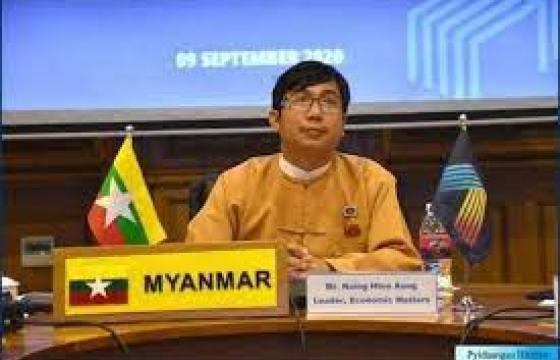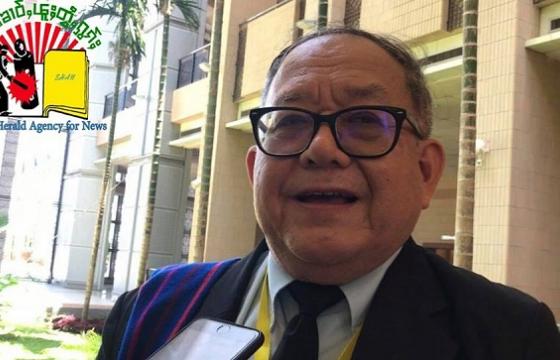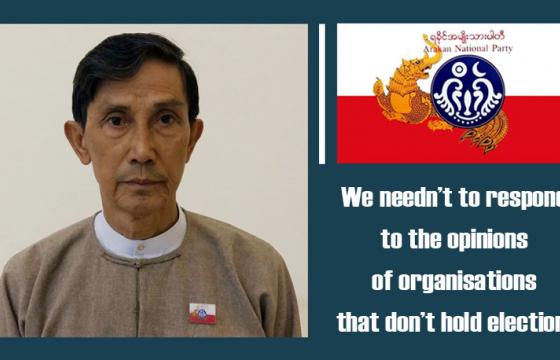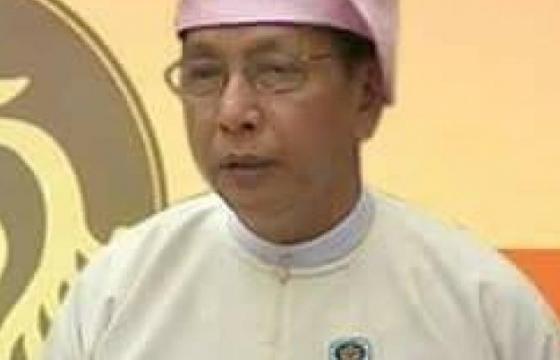The Kantarawaddy Times met with Kayah State Chief Minister L Phaung Sho last week to take stock of his first year in office, including what’s gone well and what challenges lie ahead.**
Q: Among the projects you have carried out so far, what has been the most successful?
A: [Projects improving] road and communication access were successfully implemented.
Q: What about unsuccessful projects?
A: There haven’t been any unsuccessful activities. There may be some weaknesses. And for issues that require some time to address, people may think we have been unsuccessful, but we just need more time to achieve success.
Q: Can you give an example of the kinds of tasks that will require more time?
A: Peace is one example. Time is necessary in order to work toward peace. There are [peace-related] issues that can’t be rushed. The appropriate meetings and discussions have to be held in our state in order to work for peace. We have submitted such plans to our superiors. Peace is mainly the responsibility of the Union-level government.
Q: How do you cooperate with Nay Pyi Daw?
A: The Union [government] has set down guidelines for the implementation of peace in order for us to work in line with their procedures. We submit reports about what work we have carried out to advance peace with ethnic armed organizations. There has been good cooperation between the Union-level and the state-level [governments] on many things, for example, budget issues.
Q: Can you detail some projects that will be implemented next year?
A: We will continue to work on improving the roads and communication, as well as the water supply and electricity [sectors] adding more momentum next year. Our state really needs a better supply of water and electricity, and better roads. I am doing the best I can to develop [these area[s] … with the budget allocated by the Union [government].
Q: What’s going on with the planned border trade zone?
A: We signed a memorandum of understanding (MOU) on March 9 designating Mae Hong, Thailand and Loikaw, Kayah State as sister cities. This is a big success achieve under our new government’s first year. I’m satisfied with it. We are preparing to discuss bilateral rules and regulations, as well as [implementation] procedures in greater detail.
Q: What does Kayah State need the most?
A: While we have opened a border trade zone in Kayah State, we cannot yet export goods from our state. We don’t have factories or industries. We opened the trade zone with the hope that these will exist one day. [So far] in implementing the sister cities agreement, we are focusing on the hotel and tourism industry. We signed this MOU to help instill momentum into the hotel and tourism sectors.
Q: What were the major challenges you faced over the first year?
A: Challenges are everywhere. Nothing is finished. Out administration faces challenges in enforcing the rule of law and fighting corruption. I have given clear instructions to [the state’s] civil servants to avoid corruption. They are being supervised and effectively scrutinized. We need to change the way the government staff think in order to successfully carry out rule of law and anti-corruption efforts. Similarly, the public also needs to change the way they think. For example, they need to prevent corruption by not giving bribes. I expect [the anti-corruption efforts] will be more successful if the public can effectively report corruption and cooperate with us.
Q: Does this mean combatting corruption is a major agenda for your government?
A: Stopping corruption is one of the tasks we must carry out because we can only have a ‘good government’ after we eradicate corruption. We are striving to fight corruption and we must continue to be even stricter in the future. Currently, the administration is taking a middle path. We cannot be strict in some places yet.
Q: When new administration took office last year, you said in an interview that you would make peace your first priority. What have you done to achieve this goal so far?
A: I have focused my attention on peace. There are seven ethnic armed organizations [operating in Kayah State]. Six of them have signed the ceasefire. We are still negotiating with the Karenni National Progressive Party (KNPP). I have met with these ethnic armed groups seven times. Each time that I met with them to discuss peace, I said, “You told me that you want peace. The public wants peace. I also want peace. So, what can we do?” We need genuine cooperation in order to achieve peace. We told them [the ethnic armed organizations] that we will all have to make sacrifices. We can only succeed if we are willing to make those sacrifices. If we truly want peace and want want our future generations to enjoy the benefits peace, [the ethnic armed organizations] will need to be open-minded and cooperate with us … This is the message we have given to them. They accept it. I believe they are cooperating with us. Any peace organization or ethnic armed organization can meet with me any day. We have welcomed them. I believe we have been able to get to this stage without any gunfire because we have made sure that cooperation is the foundation for peace.
Q: What is the prognosis for the KNPP?
A: I believe we have established a successful working relationship between the KNPP and our government because we are working together for peace. They want peace. We also want peace. The public wants peace. We share the same view. That’s why I believe cooperation with the state-level is 100 percent successful. Detailed discussion will have to take place at the 21st-Century Panglong Conference.
Q: What advice do you have for the KNPP?
A: I want to urge them to implement peace as soon as possible. Please implement peace as that is the truly desire of the public.
Q: What message do you want to give to the people of Kayah State?
A: The government alone cannot secure the peace and development of our state. I want to urge them to participate wholeheartedly in any way they can.
Translated by Thida Linn
Edited by Laignee Barron
**This interview has been edited for length and clarity.







